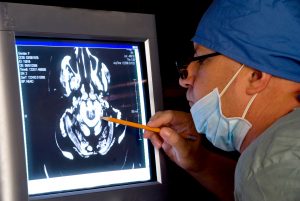Diagnosing Alzheimer’s Disease
 Diagnosing Alzheimer’s Disease can be challenging. Dementia issues can be attributed to a variety of causes. If you have a loved one living with dementia, there are numerous physical and diagnostic tests for a diagnosis.
Diagnosing Alzheimer’s Disease can be challenging. Dementia issues can be attributed to a variety of causes. If you have a loved one living with dementia, there are numerous physical and diagnostic tests for a diagnosis.
The main evaluation steps are: a visit with a primary care physician, memory cognition testing, lab tests, neurological testing, and brain imaging. It is important to note home tests are not advisable and should be avoided. They have not been shown to be accurate.
Visit With a Primary Care Physician
The first step is to make an appointment with your loved one’s primary care physician. The doctor will give a thorough exam including a physical, and discuss factors such as history, prescriptions, diet, and any changes to mood or personality. Depression will also be discussed as this is sometimes mistaken for dementia.
A family member or close friend should plan on attending this meeting. It is important for the doctor to be able to discuss with someone else any noticeable changes in mood, behavior, and personality.
Memory Cognition Testing
During the visit, the doctor can conduct exams that test memory, problem solving, and the ability to count and use language. These tests can reveal dementia issues and how severe they are. The most common tests are Mini-Mental State Exam (MMSE) and the Mini-Cog test. There are also computer-based tests. Based on the results, the doctor can recommend specialists for further analyses.
Lab Tests
Lab tests of blood and urine can find deficiencies in vitamins, electrolytes, and glucose as well as possible thyroid and liver issues.
Neurological Testing
A neurologist can do more extensive testing to evaluate the mental ability of your loved one. Some conditions a neurologist will look for are other diseases such as Parkinson’s, fluid on the brain, and brain tumors. Coordination, balance, and the senses will be examined as well.
Brain Imaging
Brain Imaging is important for someone living with dementia because it can help decipher the type of issue occurring. Also, it can provide a “point in time” image used to measure the progression of a disease.
There are four main types of Brain Imaging:
- CT (Computed Tomography): Provides a view of specific sections of the brain and measures severity of issue
- EEG (Electroencephalogram): Evaluates brain waves
- MRI (Magnetic Resonance Imaging): Provides an overview of the whole brain
- PET (Positron Emission Tomography): Detects proteins connected to Alzheimer’s Disease, glucose, and metabolism issues. There are various types of PET scans.
It is not easy to specifically diagnose Alzheimer’s Disease, especially since there are numerous diseases and medical issues that can mimic it. If your loved one is starting to exhibit memory loss symptoms, or is suffering with dementia, it is crucial you contact their primary care physician and start the process of getting a diagnosis. This will ensure they receive the necessary medical attention to treat Alzheimer’s Disease and continue to live to the fullest of their ability.
